I play a lot of walking sims. It’s probably one of my favorite type of game to play when I’m exploring alt-indie games on itch. I think they are interesting for how they explore what it means to be in a space, the relation of space to a player, and how their existence brings into question why you even need goals to be motivated to meaningfully interact with a space.
To me walking sims represent a type of interaction I can’t really have in open world AAA games. They are about carving out a tiny moment, and giving attention to a space that I would otherwise just pass through on my mission to accomplish the things a game asks me to accomplish.
For example, I’m blown away by the extraordinary detail that exists in games like Grand Theft Auto, or any Assassins Creed. I want to reach these spaces. I want to stand in them, exist in them, and look at them. I often can’t because the beauty of them is overshadowed by the sense of urgency a game places on you to be the character you are meant to be while in that game.
Open world games are often about fulfilling a role. The space you’re in is a backdrop to that role.
Travel can be a beautiful thing. Moving from one place to another, being an observer to the tiny interaction in the world around you. Taking the train to LA is probably one of my favorite things because I get to just take everything in. Traveling on the buss at night is beautiful for all the lights, sounds, the tiny phone screens of other passengers lighting up the buss, looking into the car windows of other drivers passing the buss, staring into lit office windows wondering how it’s like in that room… I’m probably not the only one that enjoys just looking while traveling. People are observant, and curiosity about what we are looking at is what makes traveling fun.
I love to wonder about the rooms behind the windows that I’m looking into.
So I think there’s something fascinatingly personal about games that allow the space to have a voice. Where just the act of travel is the incentive to play it. How a developer will cherry pick these tiny moments, visual styles to the mood of an environment, and make the game about JUST that. You get to not only see the tiny abstracted details about the world that they see, but experience it too.
Traveling through these fictional spaces becomes the connection.
When Endless Express came out (the first one) I was humored by the concept that you could have an entire game that’s all about waiting. You’re stopped. You have to slow down. The point is to travel. At the time, it was very interesting for that.
The Endless Express (the much better followup version of the original) tasks you with the same. You explore spaces by taking the train. You have to get lost. I want to stay lost forever.
The tiny subset of games that you find on itch that are JUST about looking at things are interesting for that.
In 4 Ever Transit Authority you travel through procedurally generated cities. You can change buses, and the city changes. Traveling indefinitely through the generated world that was created.
A Broken City is a fascinating broken lonely world. You search for the train and then fly over the world. That’s all you do. I loved it for that. The tiny experience of being in something so lonely, so small, so distorted, then tasking myself with following the train that aimlessly hovers over the city, going nowhere with nobody on it, and traveling on that. It’s all you need from a tiny vignette.
Then there’s “The Nightmare of a city I thought I knew”. I think things like this are interesting for how visually abstract they are.
It captures just the lights and sounds. It’s how you move through it. These mood pieces are basically like being in a dream.
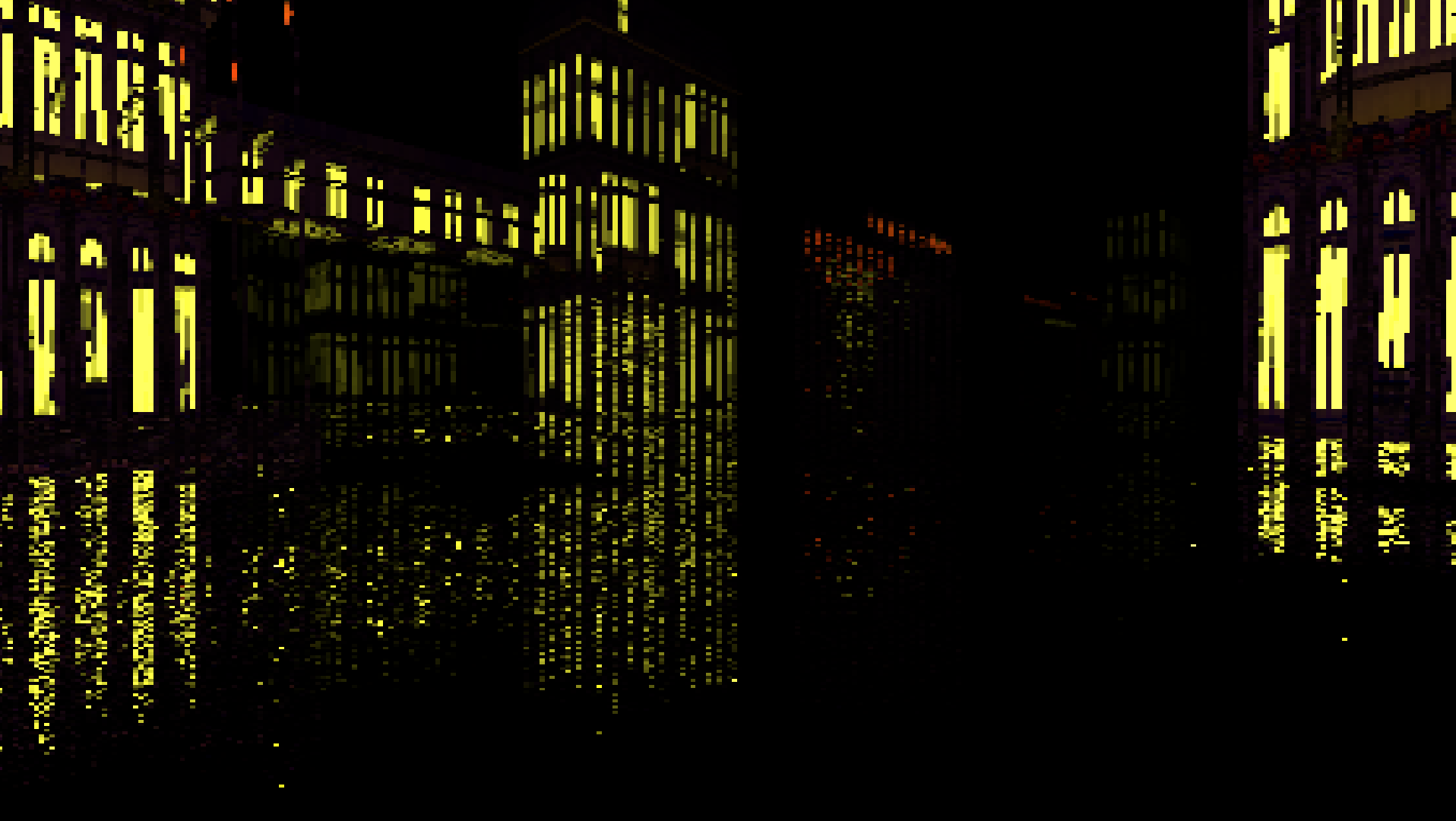
“The Nightmare of a city I thought I knew”
These small travel related walking sims are all over itch. Each is a different visual depiction of what the author feels travel is like, a city is like, a city feels like, and that mood is conveyed to you as you become the traveler in that space.
I think, in any game, the first impression you get from a world by just BEING lost in it is wonderful. It’s why I love open world games or walking sims. Walking sims probably more so. Open world AAA games actually make me feel trapped. After a while the world kind of erodes to a routine that you can’t take in anymore. I’ll explain…
I started playing GTA V again on my PS3. It’s really interesting to re-visit a heavily hyped, and heavily covered game years after all that hype, and acclaim dies down.
I remember playing it then and thinking that people defended the dumbest things about it in interest of pushing what felt like undeserved artistic merit. The torture scene, where you’re asked to choose between what kind of harm you want to cause on the person (like pull out teeth), and right after having to play that scene the character that you were playing makes a big deal about how torture actually doesn’t work. So why did you make me torture this person?
It came across like the developers got worried about how the scene would make Trevor look (Trevor being the character that you played while torturing the person, as far as I remember). So they backpedaled and made him give a speech about how torture doesn’t work. There are so many places in this game where the writing is just bad. Calling it “controversial” seems undeserved. It’s just lame.
The game introduces Trevor with a sex scene (or implying, whatever), and then later vaguely paints him as kind of ok, or at least makes a nod that he’s slighly redeemable, because (I can’t really remember, so I paraphrase very strongly) he was against hitting women or for being nice to moms or something.
Overall I can’t remember that much. I don’t feel like doing GTA V undeserved justice by digging up the details outside of memory because this is longer than I care to spend talking about an AAA game that has the budget to do better…
Overall, I got aggravated with the game’s superficial forced “tough guy” dialogue and played it on mute for most of it. In case I’m told that I didn’t give it a chance: I played it through twice (completing all missions and side missions).
Some critics praised GTA V as social commentary about LA and the vapid culture. If you make something that “makes fun of everyone” then it must be social criticism, right? GTA’s nihilism and satire are kind of lazy…but I’ll stop before getting carried away with unpacking too much of that.
There’s one part where Franklin is at his house and the women are walking out in yoga and exercise clothes chanting “we are women we are free…”
I saw it more as a badly placed take on feminism. The game has no problem putting women in place with its “satire”, but stops short on doing the same to the male protagonists that you play.
Overall the game is plenty problematic, and tends to prefer nerd culture’s view of manliness. It’s lame and lazy for that. It makes the characters very hard to care about or sympathize with.
Games like GTA V, and the critical acclaim they get for “artistic breakthrough”, story telling, and all that, is why I’m skeptical about the “games are art” dialogue when it comes to AAA games. Games are so lacking that something insanely misogynistic gets overlooked for its misogyny just for that little validation it brings to the medium. It’s new and shiny, so it’s art!
Playing GTA V feels like playing through a power fantasy from people that don’t get out much, and don’t really engage with other people to a point where they’re capable of making social commentary… So OK that’s a very rough overview of my feelings about this game.
I DID like playing GTA V for the open world, and spent so much time with it because of that.
This post is inspired by revisiting it, getting frustrated, wanting more, buying the PS4 version of it because I was told there’s more in the next-gen version, then getting frustrated by the added detail that never really gets past promising more.
The next-gen version of GTA V has dogs and cats in the world. It seemed like an easy sell. I upgraded thinking I could do more. I really want to. I love the spaces that are there. I assumed you could interact. I want to interact, but sadly the same limitations plague it like so many other open world games.
After maybe two weeks of playing it I come back to the same conclusion. It’s the same conclusion I come to when playing any AAA open world game.
I feel trapped in this thing.
So here’s what interests me about interacting with AAA open world games v.s. indie open world or walking sims…
I can’t enjoy the scenery in GTA as much as I want to. I can’t explore to the extent that I would like. I leave slightly disappointed in the preference the world sets for me. I can’t pet any dog I encounter, but I can kick any dog.
Funny story…
In one of the building complexes was a lady on her phone with a cute dog next to her. I’m like “yay! look at that dog!”
He was sitting next to her looking up at her. It was really cute.
I walk up. She drops her phone and runs away.
The dog doesn’t follow. The dog is still sitting there.
I walk up to the dog wondering if maybe I can pet it.
No button works, so I try the one that’s usually for punching.
I kick the dog.
Dog is now lying there, not moving.
I feel very bad.
The only way to interact with this world is to fit into the character that the world want to jam me into. This is kind of the same frustrating conclusion you end up with for any open world AAA game.
When being in these worlds, I want to walk around and look at the pools and lights in the windows, but I feel rushed. The environment isn’t really meant for that.
The world is lost in the urgency to accomplish a goal.
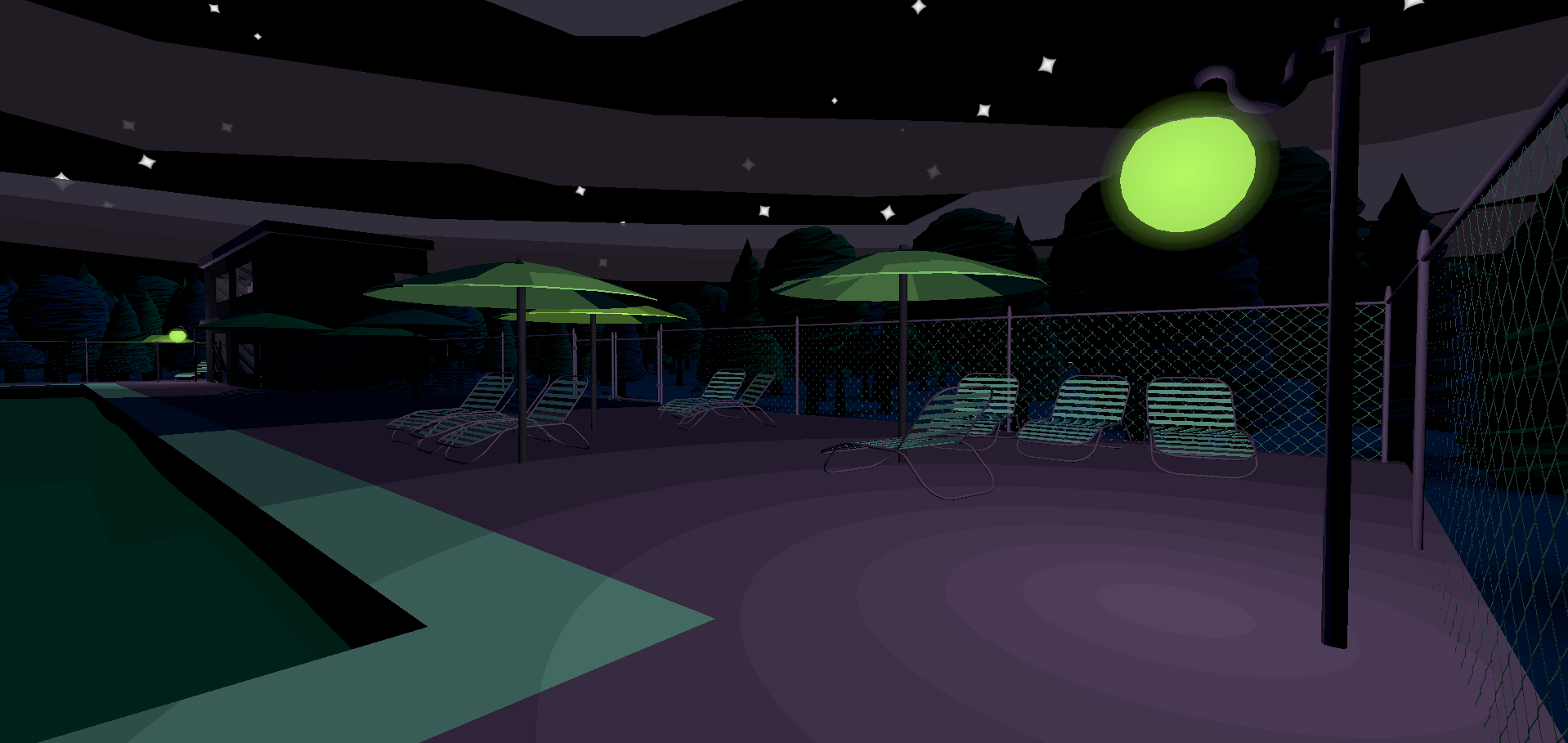
Example: Star Swim in East Van EP (Places its focus on an abandoned swimming pool. You fall down the drain. The space deteriorates into surrealism.)
This is why I think walking sims are so interesting. They’re easy to dismiss because they don’t fit into that mold of urgency, play, mastery, accomplishing… but this is why they matter.
They focus on that one environmental moment that might otherwise be lost in a game.
They are about the light somewhere, the sound in a corner, the pool that you really want to splash around in REALLY lets you do that without judgement or a mission… The tiny things we might not notice become the center of attention.
I love how they encourage you to carve out a fictional space for just that one moment.
In a way the act of just being in a space can make you feel more welcome than being tasked to survive it.
I think it’s interesting to contrast a play experience that you may have with walking sims, against AAA games like GTA that invest SO MUCH resources into a believable environment that always feels out of reach.
I think the amount of detail is what can set you up for disappointment. When you want to go eat the food, or pet the cat, but really can’t because these elements are decorative VS. the amount of detail placed into simulating a realistic mass shooting in that world… whatever, AAA is weird.
An interesting contrast to a big budget explorative environment against a small one from a solo-dev is a game like Even the Stars…
The experience of traveling in Even the Stars was intriguing. You punch in random coordinates. You fly around a very low-poly detail lacking planet (if you happen to encounter one). You can find pixelated cities, ruins, structures… and it lets you chose how to interact with it. For example, you can select to “walk around the city” and the game gives you a small generated story. Like it will describe a food you ate while there.
I find this interesting because the lack of detail, abstraction, and tiny story vignette you get, really inspires your imagination. I wonder about the little shred of information it gave me. It’s like a small exercise in day dreaming.
I think small things like this work, in their own way, because they don’t over promise so much in the world that they place you in.
The way a game lets you fill in the gaps with your imagination, by omission, makes me feel more welcome and part of something’s narrative history. For example, a lot of Kentucky Route Zero can happen while on that map. There’s not much detail except for icons and text. The world feels very rich for how it controls what it omits, what it lets you assume about it, what it insinuates about itself…
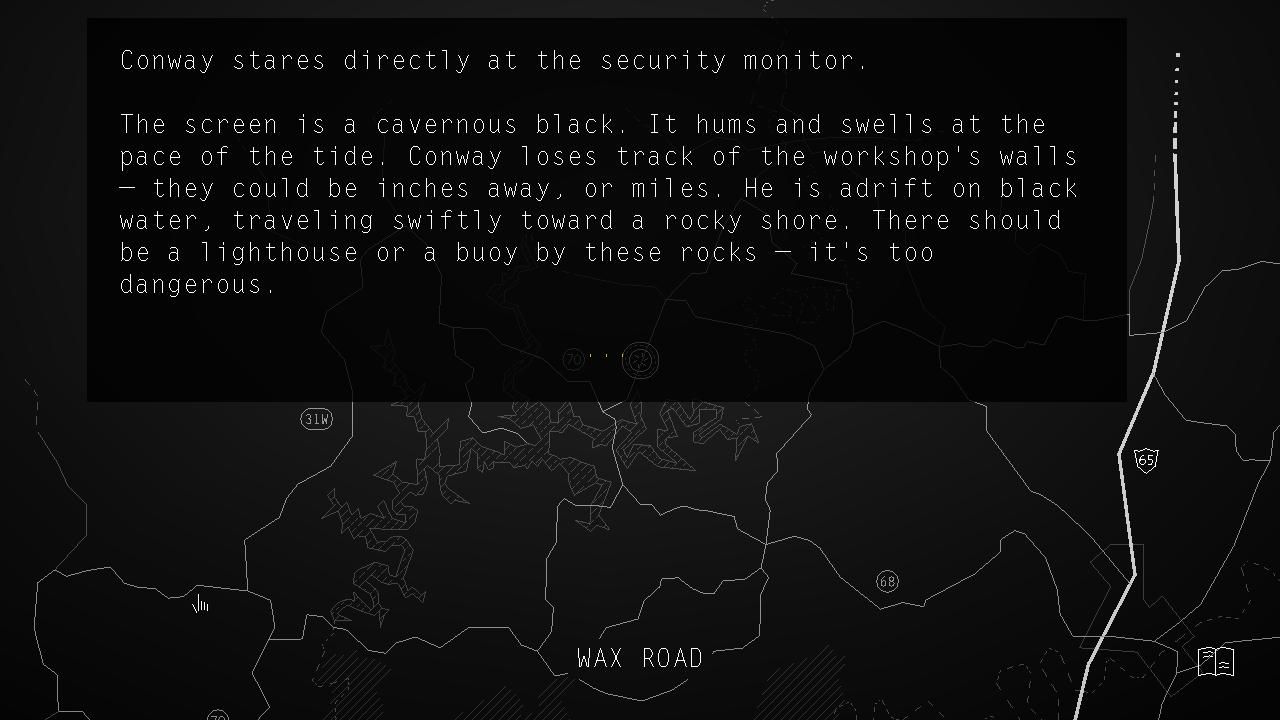
Alluding to things is a creative tactic used in a lot of media. I think it’s very interesting when it happens in games.
Games kind of have moments where that happens accidentally, because of the environment. Then it’s a moment that captures a player and they wonder about a thing that can lead nowhere. You can’t control a player’s behavior to the full extent that a movie will control focus of the viewer. Storytelling tends to be done by guiding a player as much as it’s done by just telling.
An interesting moment in a game that I often wonder about was in Assassin’s Creed (the first one). Somewhere in the world is an area where there’s a lake with an island in the center. On that island is one tree. The music when you’re near a certain part of that lake is totally different from any other part of the world. As far as I remember it was piano.
Ok, I swear this is real and I could find it again because I spent so much time walking around in just this one spot totally drawn in by that dumb piano. It intrigued me enough to think that I had found some small story extra. This one place, and that small difference in a song (piano, I swear!) made me more curious than any other part of the game, even if it never lead anywhere.
I’ll point to Secret Spaces, by Heather Flowers, as my indie game example that does this sort of thing intentionally and in interesting ways. It doesn’t say much about itself from the start. If it weren’t for the notes you find you could easily dismiss it as just a generative experiment with no point. The details lead you on. I think this example is really interesting for how easy it would be to dismiss otherwise.
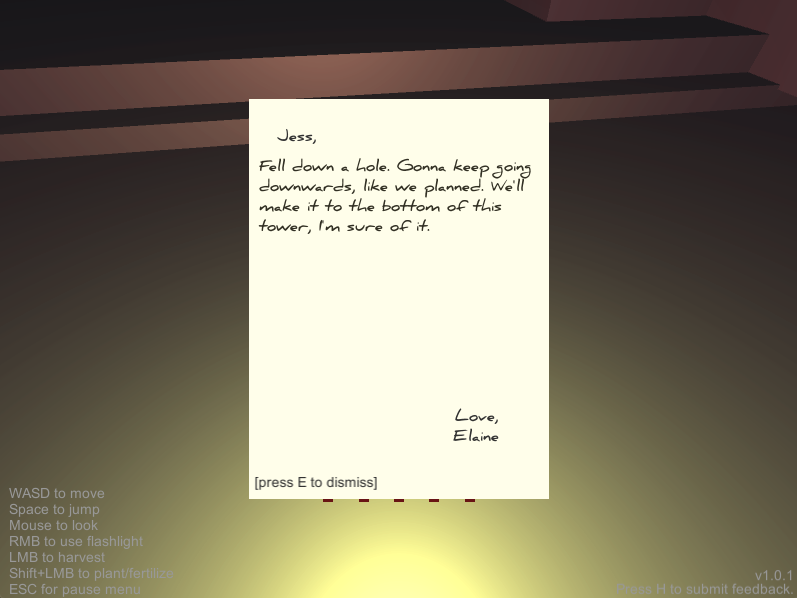
Not all exploration games are open, and let you explore in all directions at will. Some guide you on a journey forward. These I think become interesting because you feel like you struggle to take in the space to understand as much about it as you can so you know what is happening, while dealing with the overwhelming feeling of being lost in some surreal world. Like how the player is dropped in and out of things in Trip Gate.
Trip Gate is probably one of my all time favorite walking sims for that. It has everything. A loud overwhelming visual style that’s both zen-like and alien. Strange indistinguishable structures…and you have no idea what to do. The game gives no indication. Through some trial and error you find these gates and go through them. You travel from one space to the other. Each different, some more than others. The experience is fascinating for how much you wonder about what this space is. Where are you? What’s the story? It alludes to so much while letting your imagination just kind of take over. There is an end to it. If you don’t want to play it, you can see a lets play of it here:
Another explorative game that manages guiding a player forward in an interesting way is Bellular Hexatosis.
I would be remiss if I didn’t mention this one here.
It’s one of my favorite things that I’ve played this year. It’s just stunning and powerful.
Everything about it is special to me. The writing is exceptional, evocative, what you are doing and the reason for it is so strange and abstract… It’s just amazing. It’s the closest thing to an actual Myst-like that I’ve ever seen. It’s more than that, but if you need a comparison “Myst-like” works.
You click to fly from one point to the other. The goal is to save your dying sister. Your sister is this beautiful giant structure… The delivery of dialogue is interesting too. Bellular Hexatosis does a lot that’s really unique. It’s an exploration game, that’s very restrictive in how you move through the environment, but all the more evocative for that.
I can’t recommend it highly enough.
La Dispute’s Panorama is something like an interactive music compilation where you are basically given the length of a song to explore a space. You’re in a dusty pastel world. Things are ghostlike, surreal, everything is distant. You move as a small group of origami-like sculptures while the song plays. Lyrics are laid out on the ground, in front of you…It’s a beautiful experience of flowing through something. You move through, forward, no context other than the song.
Similar to Trip Gate is Dream Warrior.
Which also lets you travel forward through a surrealist space. It’s also a beautiful experience.
I use these four examples because I don’t think these spaces would be as impactful if it was for clear goals, or mechanics and gameplay. The space would get lost. I think it would become annoying even, when contrasted against some skill to master. The experience could easily switch to become overbearing.
The lack of explanation that you are given kind of makes the space yours for how your imagination gets involved to rationalize what it might be.
So this is interesting because this TYPE of approach to a game makes very loud surrealist spaces possible. These very visually overbearing surrealist experiences are just not as functional if the focus would be on something more like a traditional game.
Like I think it’s really interesting when a game, with rich spaces, has this dependency to force you down a narrative path and how you lose curiosity for the space you are in because of that.
A big budget example would be Devil May Cry 4 (any really, but I think 4 was the weirdest so I pick that). You are in these beautiful environments that are backdrop for The Mechanic. It’s about the routine.
I played DMC 4 to death, unlocked everything, finished all the modes, including HaH mode… and I barely remember much about the environments the game is based in. I remember the general theme, but not the specific details of the spaces. Not the way that I remember many of the walking sims that I bring up here. I think this is because the focus is on the routine of progress. The beautiful space is just a backdrop to that progress. So it’s interesting how a game can force me from point A to point B, but I will not really remember that space between because it wasn’t ever about travel. It was about the task, mechanic, mission, enemies…
Is it really necessary to lose these beautiful spaces to that progression? Can there be a balance where I’m allowed to exist in a space in a way that I’m part of it?
I stumbled onto Like Camping while casually browsing itch. On a whim I decided to run it. It’s a beautiful little surrealist experience. You navigate a landscape wherein tiny secrets exist. There’s a beautiful field of flowers. When you get close to them it turns out the flowers are huge. You walk through them, looking up at the giant blooms.
Browsing itch I randomly found Late Night Observations it’s a tiny island dotted with a forest. It’s calm and dark, you can look up at the stars. There’s a small camp with a boombox. If you turn it on, tiny glowing music notes light up the space. The experience is a lovely tiny vignette of exploration.
I don’t remember how I first found it, but Brutalism: Prelude on Stone caught my eye for the unique look in the screenshots. Moving through its spaces is a stunning experience. I can’t recommend it enough. Prelude on Stone is installation art inside of a massive brutalist building. Its huge structures towering over you. You feel cold and lonely wandering its halls. It’s situated somewhere in the middle of a white desert. I don’t think I’ll ever get close to something this stunning in real life. Passing through these spaces is like passing through impossibly fantastic spaces in a dream. It wouldn’t be possible anywhere else.
Video games, as a generalization, are notorious for goading a player on. You must accomplish, move forward, conquer that thing, overcome the challenge. A game must be finished. This has kind of normalized a type of play. As a generalization, gamers enjoy that, but at the same time this has alienated a lot of other people for that preference.
Games aren’t for tired people.
Some people are too worn out to be “given more work” by a game. I remember watching Grace Bruxner give a talk at Fantastic Arcade about her work and it kind of dawned on me how “yeah, being told to do things can kind of suck.”
Sometimes just walking around a happy little fish market with quirky fish selling fish things is enough. I like just doing that. I don’t want to do chores. Conquering That Thing or stealing that car to go take a person to that place and run that heist is work sometimes.
I found that I was often the type of player that tried to avoid playing the game when in its world. I loved early shooters like Quake, Blood, Kingpin: Life of Crime, Quarantine… I mean, they look ugly now, but at the time when games started doing 3D environments it seemed unbelievable. I played these things to death. There where times that I would try really hard to avoid all the enemies and monsters, just so I could take in the alien landscape. So I could feel like I was actually PART of the world rather than a transient entity there to finish the goals set for me.
I still notice this when playing AAA games today. I kinda feel rushed by overbearing goals when my instinct is to stop and take in a beautiful environment that I would never be able to be in in real life.
Two examples come to mind…
Bernband is a very evocative world to pass through. I think it’s amazing for how it manages detail. Like a lot of walking sims the world is intentionally low fi. The beauty of the environment is the lights. It’s largely about what it visually omits. Bernband is more about what you hear, not so much about what you see. The game isn’t the same when played without sound.
Diaries of a Spaceport Janitor is a large, beautiful world, that on the outset seems infinite. You explore a spaceport as a lowly janitor to search for items to burn. It’s a very smart commentary on a lot of things (gender, capitalism…) and I get that in most of this post I’m talking about being “against” doing things in a game, but I feel like the dumb task of picking up trash it gives you is a bigger incentive for you to delve into that world. Trash seems like a great conduit for discovering a city.
I think it’s beautiful for how low fi it is. The art style leaves a lot to interpretation. It’s alien. The inhabitants are vague. It lets your imagination participate.
Feeling rushed through an environment in a game could probably be chalked up to pacing. Saving the world, running a heist, defeating the thing… I guess all involve a sense of urgency, but I would argue it’s about mismanaging expectations with what gets promised in all that AAA detail.
Like (back to GTA) it’s weird how in GTA V you can’t pet the dogs or cats.
Yes, this is my pet peeve. It’s the thing that went too far.
You can kick the dogs. You cannot pet the dogs.
You can interact with the environment in the way the game has been designed to progress the story. I can shoot. I can cause a traffic jam and blow up large amounts of cars. I can combine the few ways that I CAN actually interact with the world to cause maximum chaos. I can’t sit down on a park bench and watch the sunset. I want to go to a restaurant and look at the foods, but I can’t.
ACTUALLY being part of the world is always just out of reach.
The joy is found in blowing things up since that’s how you play the story. Anything else is backdrop.
So you are constantly in a state of disappointment when you’re in this giant world. The detail promises something that will always be out of reach.
I think, like in a lot of the examples I’ve given (Bernband and Diaries of a Spaceport Janitor especially), managing that detail brings that space closer.
Managing detail doesn’t have to be low-fi.
For example, Off Peak is an interesting thing to look at. The environment in the game is rich. There’s so much to look at when exploring that space.
You can eat the food, talk to the things… There’s detail everywhere, but it doesn’t over promise. It’s balanced to fit the objectives.
Here’s a really weird story from playing it…
I played it when it first came out, and found the cookies in the subway. I ate them all. For some reason I remembered that you would “black out” after eating them because they where sketchy subway cookies. Years later, when showing it to someone, no fainting or blacking out took place after eating all the cookies. I don’t know why I remembered that incorrectly, but it’s fun how these games will occupy your mind the way they do.
It’s a vivid game. I think its success, the way the world will stay with you, and why playing it is so enjoyable, is because of how it manages expectations.
It might seem like a dumb thing to ask of a game that’s about epic heists and stealing cars, but not being able to interact with the world on a deeper level (eat the food, sit on a bench, pet the cat, walk into buildings…) breaks the immersion.
For example… I haven’t been able to play the series for a really long time because of personal reasons, but I used to feel this way about Bethesda’s The Elder Scrolls games. Morrowind in particular.
I want to pet the strange exotic creatures too, but they keep wanting to kill me.
As if urgency makes an environment interesting?
I would argue that incorporating a player peacefully can do just the same. It’s interesting to point out too how, once you disabled blood thirsty animals in Morrowind, the game’s environment became more immersive. It’s probably a dated example now, but I love how obvious of a fix it was.
An interesting indie counter example to this would be Abzu, like how you can be part of a space and inhabitants don’t necessarily have to be hazardous to be interesting.
In interest of kicking a dead dog…I mean horse, back to GTA V and my grievance with the animals.
I don’t really understand why you would put in cats and dogs and not let a player pet them.
I want to drink the wine that the vineyard left out on the patio in the hills. There’s so much wine, but I can’t touch the drinks… Why have them there? Why all that detail? I feel trapped and have to wonder… Does the promise of interaction, and then not letting that interaction take place, make a game more shallow?
Maybe this is why I find so much joy in the small indie stuff. The detail in these games doesn’t overpromise. I feel part of it for how my imagination fills in these gaps.
A game like Orchids to Dusk drops you off in the middle of some alien planet. You are a stranded astronaut with only a few minutes left to live. It’s something you can quickly figure out without reading the game’s description. There’s a sense of urgency to explore, to understand where you are, before you run out of air. Once you die, your body becomes something beautiful. Then you understand the landscape of the world that you are in. It’s chilling, but beautiful.
The Library of Babble is a very minimalist piece. It’s not really a space, but an abstract depiction of terrain. You gently glide over it, finding tiny stories that other players left behind. You can write things too for others to discover. It’s a beautiful narrative project. The visual constraint, how you are left with a tiny abstract island, is what makes it so interesting.
Bleakstead is a small game that takes place at night. You wake up on a bus and it’s the last stop, a small desert town in the middle of nothing. You explore it. There are ruins and secrets. It’s a strange town.
Another silly example, to contrast against open world AAA games, is Red Desert Render…
I was just recently hanging out with a friend and he was telling me how he tried Red Dead Redemption and found it too much of a time sink. Like playing it, and the amount of things it asked you to do, felt like work.
Red Desert Render is a game that’s a response to the out-of-bounds adventures with friends in Red Dead Redemption 2 online.
You can first person roll down a hill! This one feature is basically all you need in a video game.
Red Desert Render is an interesting example for how you can take an AAA game, distill what you might like out of it, and come up with something like this.
Very often when playing a game, beautiful spaces are lost to the agenda that you are drug through.
Not always, but often enough to make being part of a world anti-climatic and feel like work.
I find it really fascinating how No Man’s Sky gives you this vast procedurally generated universe, but most of your interactions with every space remain the same.
You mine for resources, basically destroy the environment, and move on to do the same further into the universe…
I get that there’s a story. I’ve been playing No Man’s Sky since it came out.
I love No Man’s Sky for what it does well, but I don’t necessarily enjoy how you interact with the universe itself. I don’t mean to criticize it too much, but it’s an interesting example when talking about colonialist or capitalist tendencies in video games.
Part of me wants to regenerate a desolate planet. I want to terraform, recover, plant, or hybridize too. I want to save the animals, or maybe even help them. I don’t know… Just reach out to the space that I’m in.
Tearing down, using it as a resource, is such a trope when you approach an environment. Especially a sci-fi one.
(Older example: Genewars, where the premise was a world that you studied, terraformed, and built on, but to race against time to defeat an opposing team so you get the planet. The planet is the resource…Kinda colonialist in an anti-climatic way.)
For example, Mendel is a game that lets you just plant things. It’s an exploration game for how you hybridize plants. You even wait for them to grow so you can see how the plant looks. What direction the plant took with the combination you planted. You can cross breed them and keep planting indefinitely. Coming up with new and interesting plants.
It’s weird that it satisfied my craving for being part of an “alien landscape” in that way more than planting things in No Man’s Sky did. I wished participating with the environment in No Man’s Sky was more like that.
I think it’s because in something like Mendel the reverse is the focus (you “give” to the world you’re in, instead of take).
So here’s an interesting thought…and I’m sorry that this is getting long. I’ll try to start wrapping up this post.
Does consumer ideology influence our design choices too much? Has capitalism created too much of a narrow mindset for us when we imagine alien spaces? How much colonialist ideology are we bringing to these stories and is that even necessary? It’s a fictional universe, or world. It could be anything. Why is it so often treated as a resource?
What are our unquestioned capitalist and colonial assumptions when we look at an environment, assume what it should be for, and how we design interaction for it?
I feel inclined to take this back to GTA V and pick another example but I wont.
Either way, I think about that a lot when interacting with game worlds.
Don’t get me wrong. I enjoy No Man’s Sky, and a lot of other games like it, but somehow games like this always fall into these subconscious tropes.
It’s weird to me how these things have to have a competitive angle. I have to conquer something. I have to make it mine. Even if it’s about exploration, what I’m exploring is up for grabs, to make mine.
I can’t just be there to help a planet survive, because of need to consume my surroundings. The world you’re in feels more like another giant inventory item for that.
Interesting games to juxtapose against this aspect of No Man’s Sky are…
Even In Arcadia, a walking sim based in a distant future in which capitalism and consumerism have continued to run rampant, corporations have replaced all government, and planet Earth has long been relegated to legend.
They Came From A Communist Planet, a first-person adventure game about depression and revolution. I love the description:
“Stuck in a cycle of debt and isolation, your world suddenly changes when aliens reach earth carrying a message of social insurrection.”
And (of course) Diaries of a Spaceport Janitor.
When it comes to AAA vs. indie vs. alt or art indie, I’m in no way saying that one is better than the other. I love accomplishing things in a traditional game too, but it does get old.
I feel like it’s important to validate walking sims when so much importance is placed on open world AAA in contrast to work done by all the tiny experimental indies exploring the concept of space to convey things.
Most games treat the environment as a resource. It’s something you use for the mechanic. You mine it, you build it, you pass through it to get to that objective, you fight things in it, you blow things up in it, you run away from the monsters in it… It’s not the focus. The environment is rarely something you REALLY are part of because of that.
I think a lot of joy can be found being in an impossible, alien, otherworldly, sci-fi, punk, historic, or whatever wonderful setting the story is placed in… These things get lost in the constant urgency of task that a game creates.
Granted some games do exploration better than others (I used to be an Elder Scrolls fan because of that), but it’s hard to ignore The Game when you’re in it.
In a way even games are about productivity. Something always has to be accomplished.
To me, walking sims represent a rejection of all that. The roles are reversed.
The goal is a vague concept hovering in the distance, often entirely up to you, and the environment is what you’re allowed to be in. You’re not rushed by objective. You get to exist in that beautiful space, as a moment that you carved out for yourself.
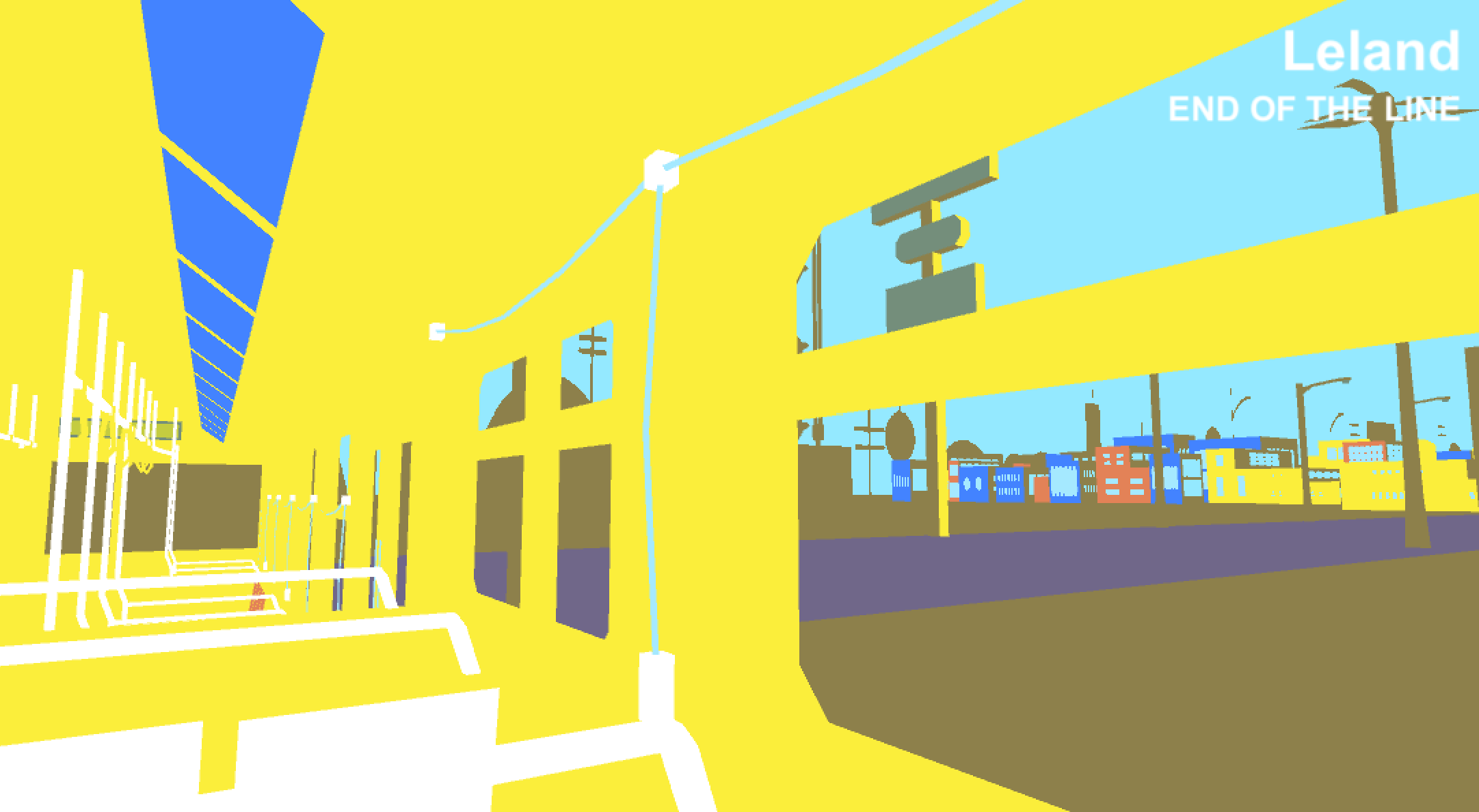
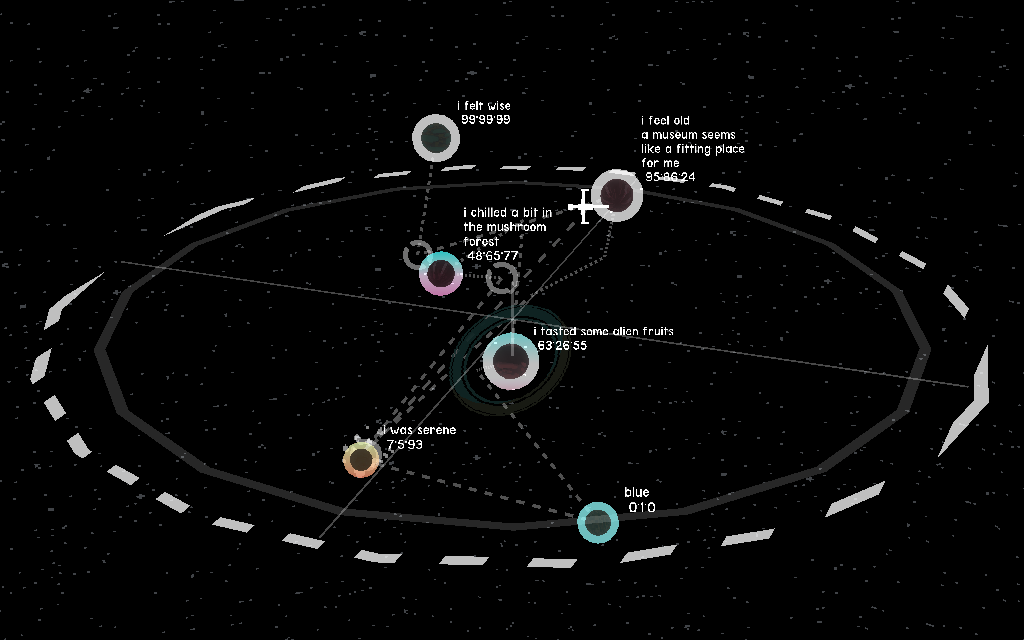
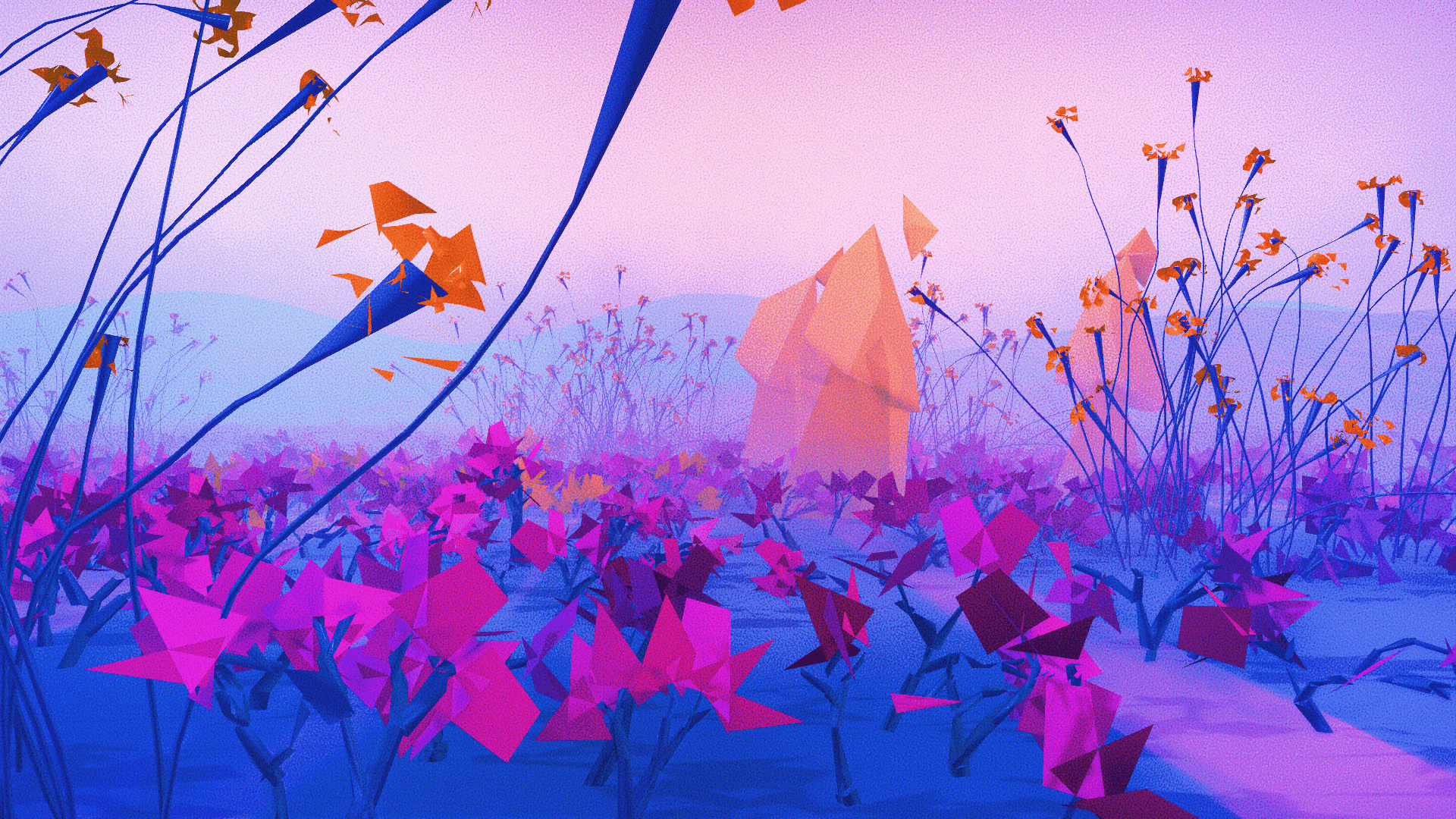
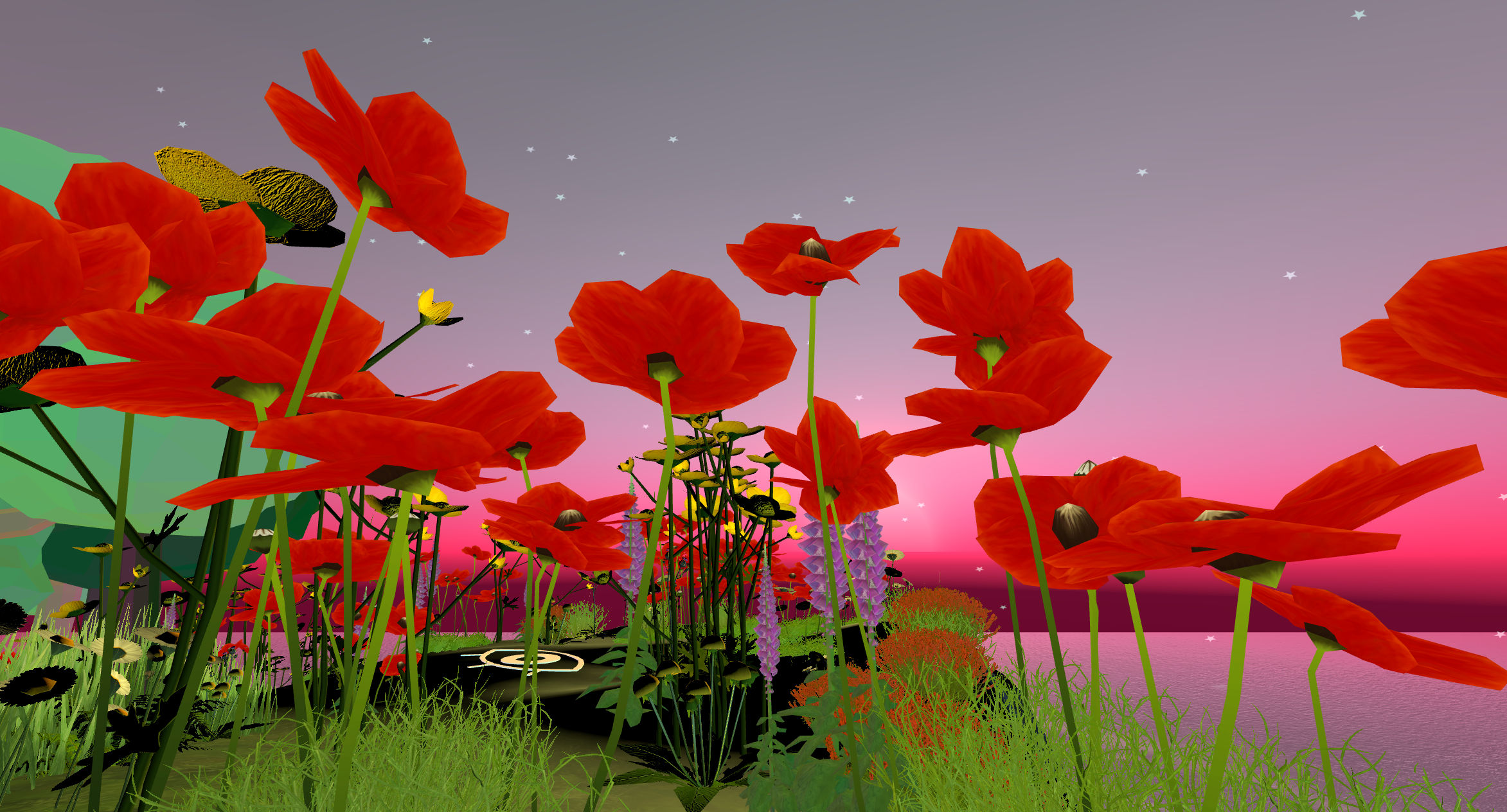
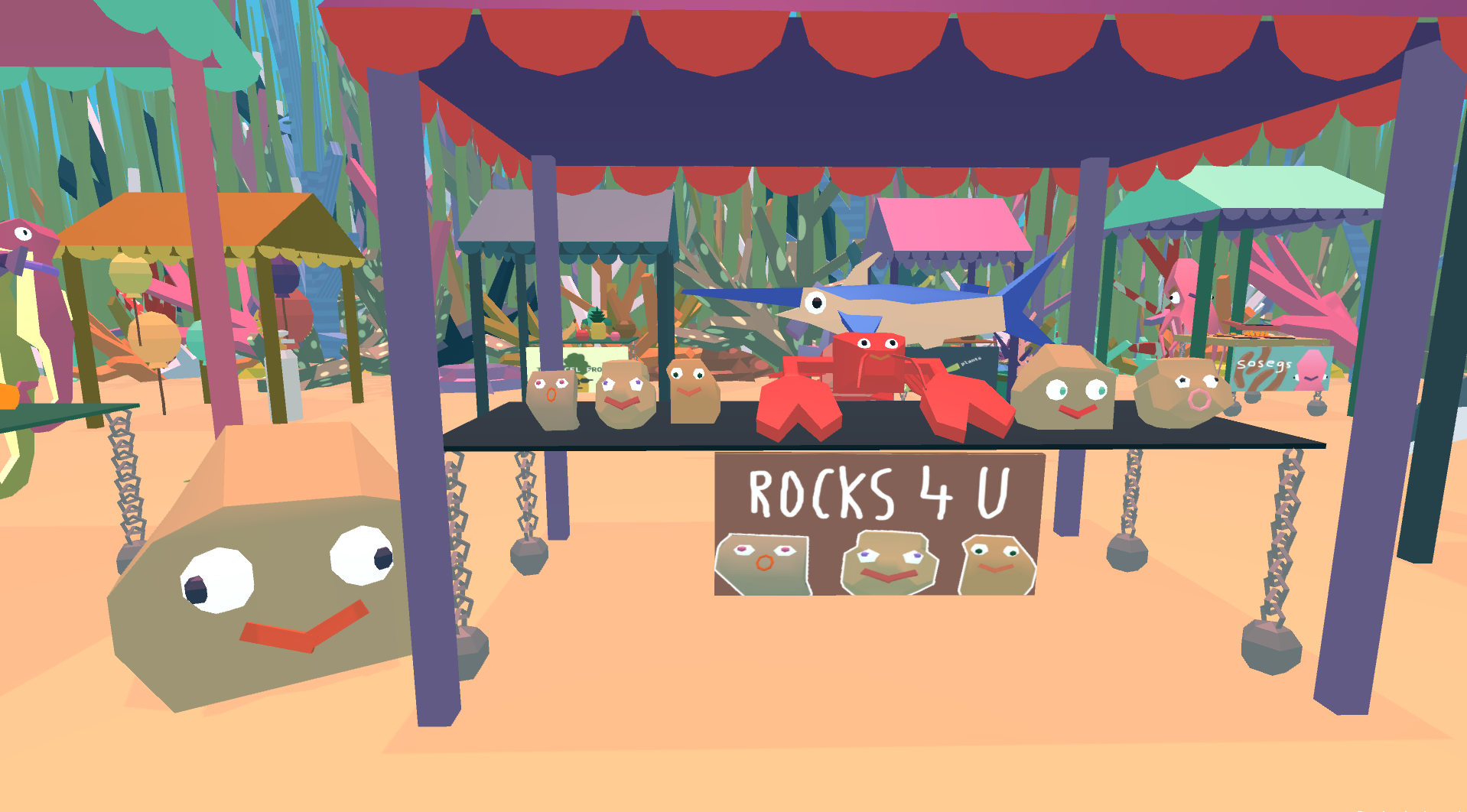
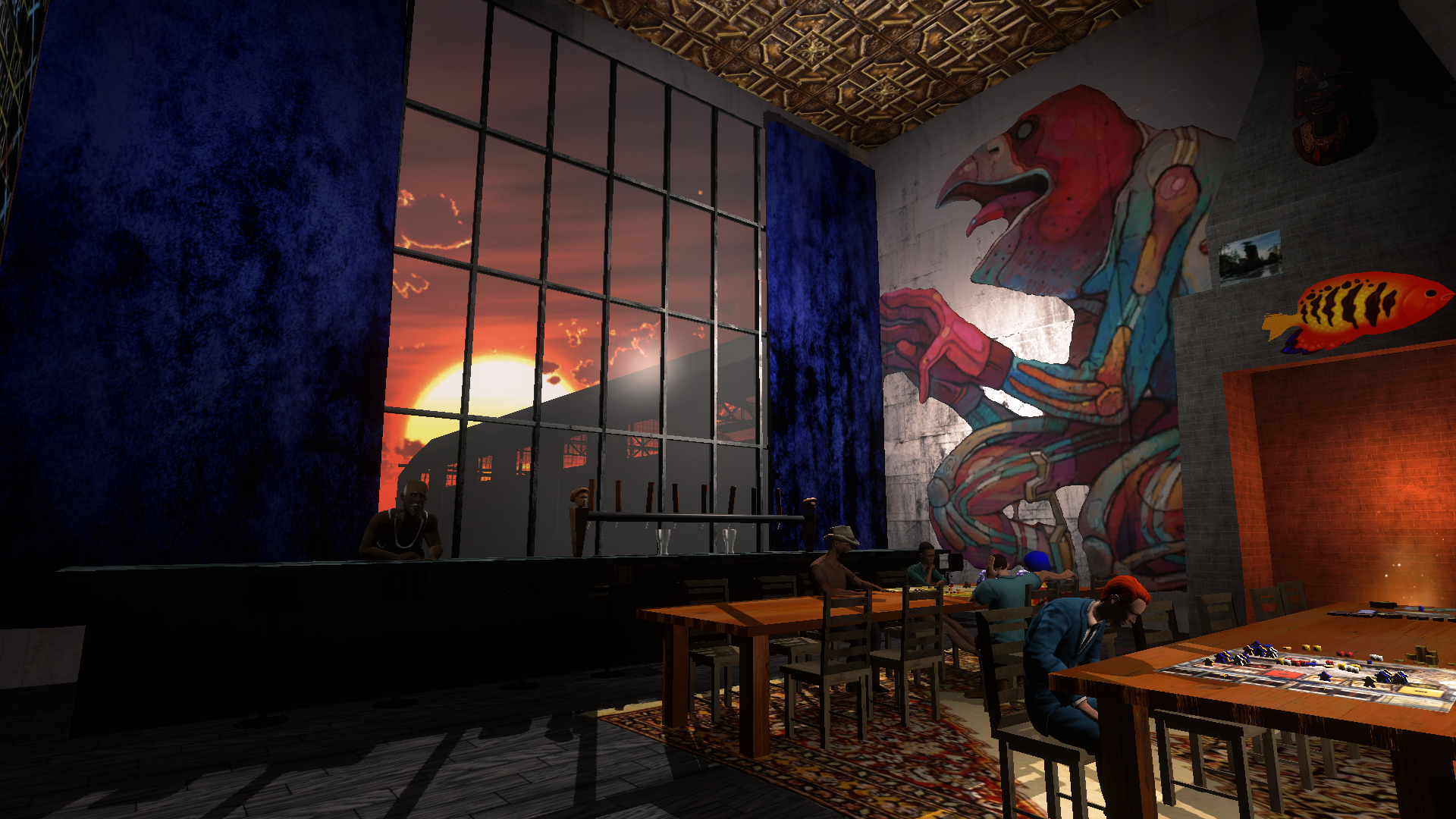
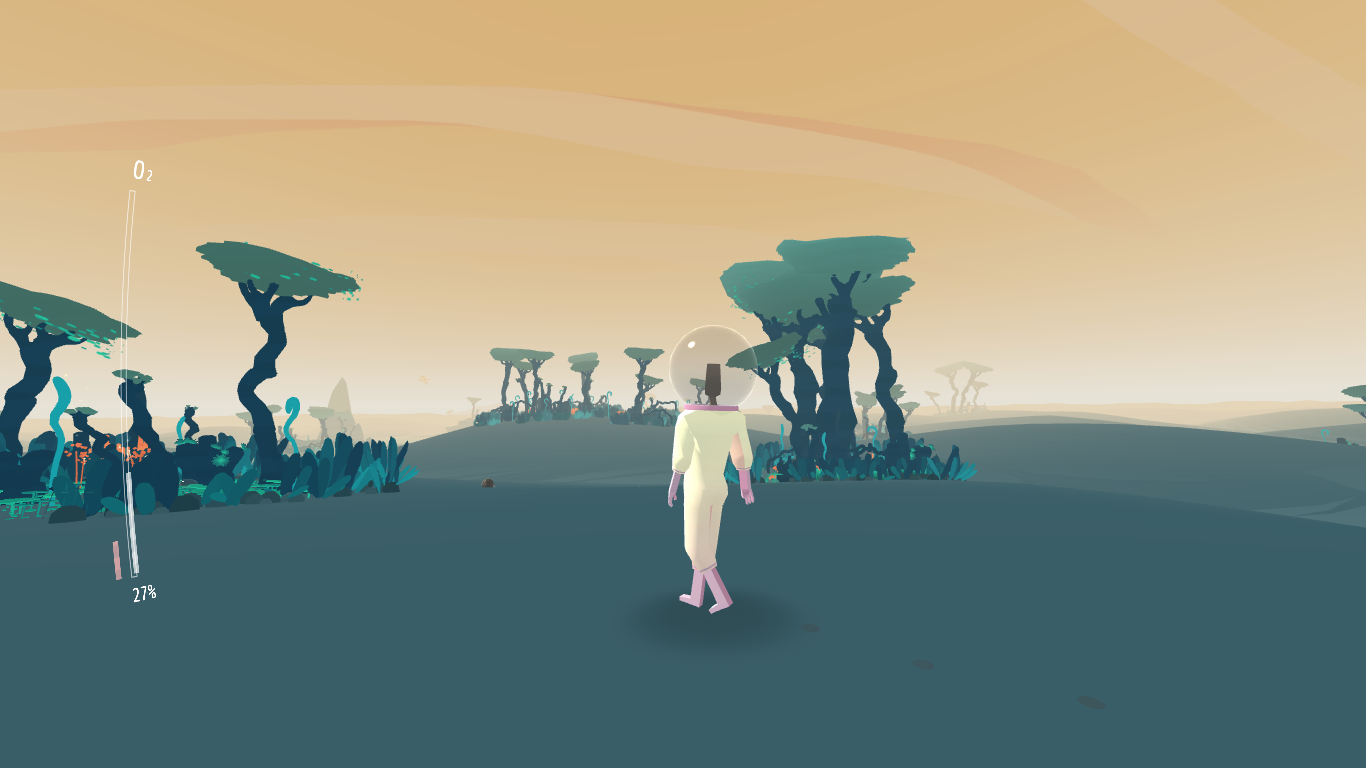
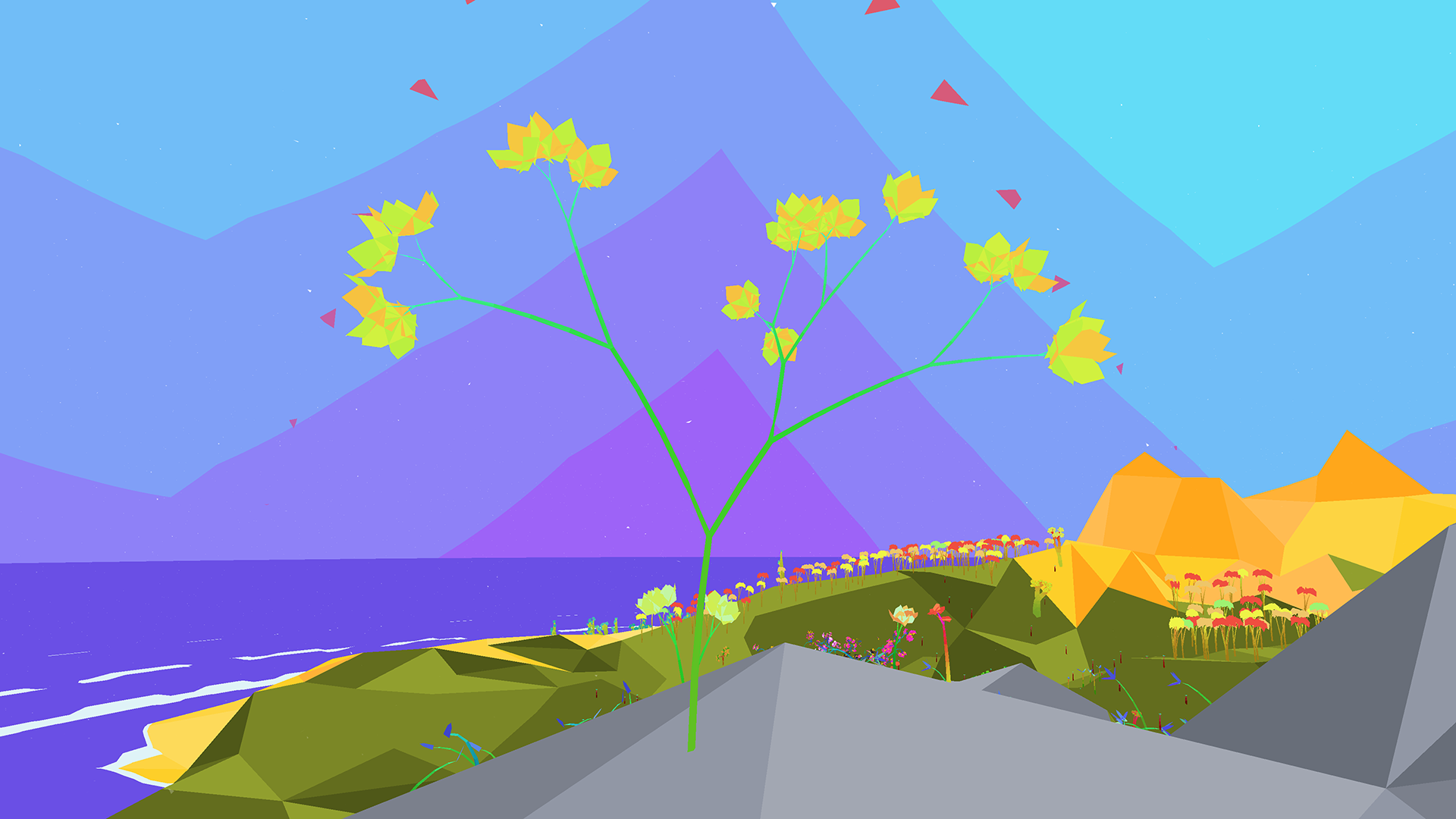
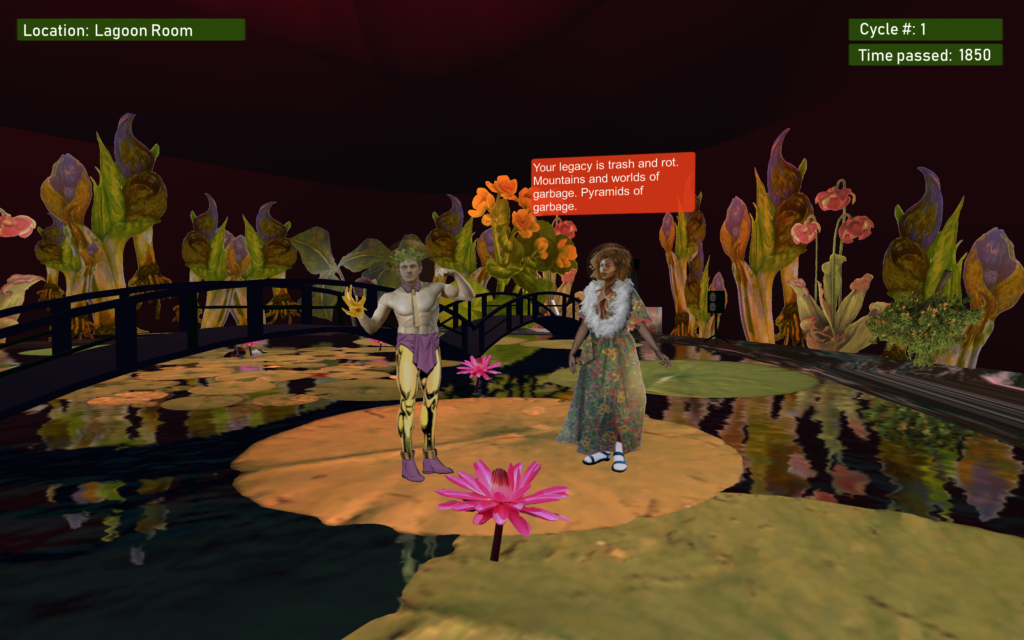
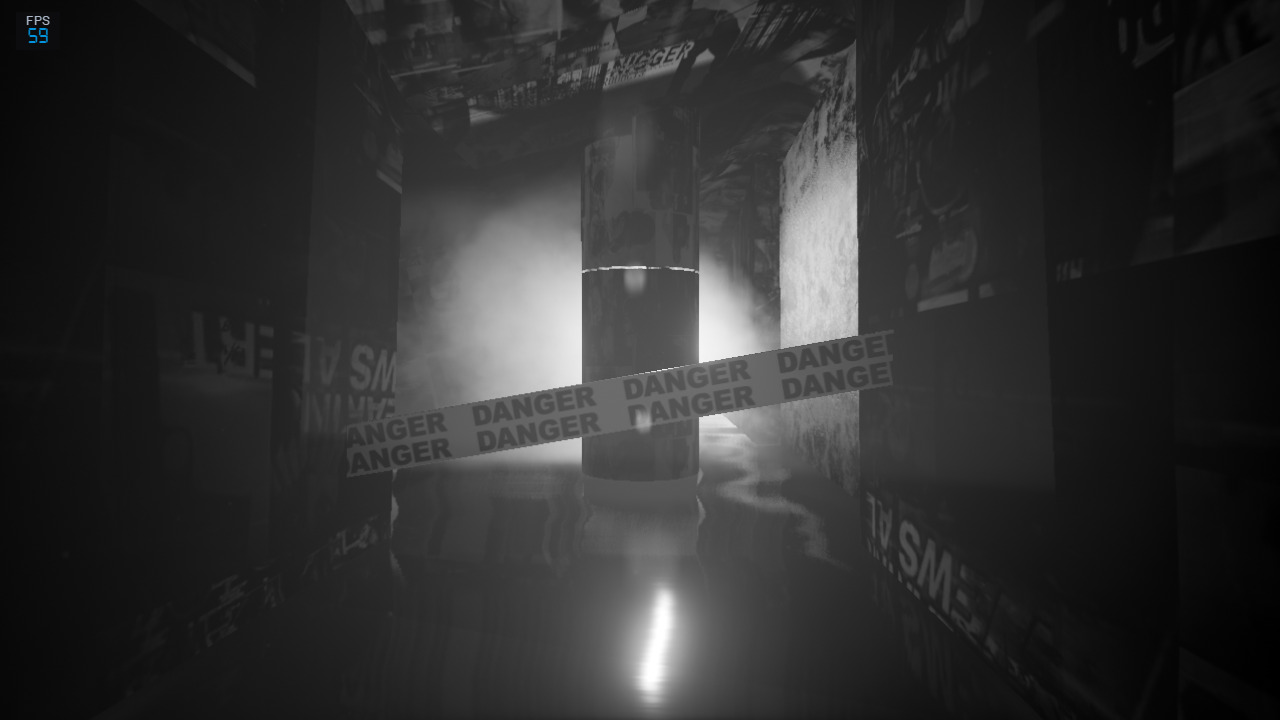
4 Responses
[…] string of experiences that explore various themes. Like many alt-game walking sims, playing is almost like being in a surreal dream. AAA does this extremely well. I love how they break out of and into the various themes, while […]
[…] personality… an in-depth look… games as found objects & virtual relics walking sims and the joy of existing in a virtual space the future of my games on Apple (post-Catalina) and what this means for art games in general […]
[…] anything be done to break away from that? games as found objects & virtual relics walking sims and the joy of existing in a virtual space the future of my games on Apple (post-Catalina) and what this means for art games in general […]
[…] and can anything be done to break away from that? games as found objects & virtual relics walking sims and the joy of existing in a virtual space the future of my games on Apple (post-Catalina) and what this means for art games in general […]